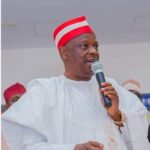2027 Power Play: Inside the Tinubu–Kwankwaso Meeting That Never Happened

It was a meeting that never happened, but its mere suggestion has rippled through Nigeria’s political landscape like a stone tossed into still waters. In politics, sometimes the absence of an event speaks louder than its occurrence.
The Origin of the Rumor
In the early months of 2025, whispers began to circulate across media platforms and political circles that Tinubu and Kwankwaso were plotting a high-level meeting. The speculated agenda? A potential alliance ahead of 2027—a handshake between two of Nigeria’s most formidable political tacticians.
While both camps issued vague denials, their silence on specifics only fueled curiosity. Pundits and insiders began to draw conclusions: was Tinubu looking to strengthen his grip in the North ahead of a re-election bid or a succession plan? Was Kwankwaso contemplating realignment, trading ambition for influence?
Why the Meeting Mattered—Even Though It Didn’t Happen
Tinubu and Kwankwaso represent powerful blocs in Nigerian politics. Tinubu, the architect of political coalitions and current occupant of Aso Rock, still commands a vast network in the Southwest and parts of the North. Kwankwaso, on the other hand, leads the formidable Kwankwasiyya movement, a grassroots political engine in Kano and other northern states.
A meeting between the two would have signaled a seismic shift. It might have been the prelude to a mega coalition that could realign Nigeria’s political order—potentially marginalizing both the Peoples Democratic Party (PDP) and any emerging third force.
Even without a formal alliance, the optics of such an engagement would have been powerful: a show of unity, political maturity, or at the very least, strategic respect.
The Forces That Kept Them Apart
So why didn’t it happen?
Multiple sources point to deep-rooted mistrust. While Tinubu may admire Kwankwaso’s popularity in the North, the former governor has built a career on independence. Aligning too closely with a sitting president—especially one from another political tradition—could erode the anti-establishment image that has kept his base loyal.
Then there’s the matter of ambition. Kwankwaso has made no secret of his presidential aspirations. Would he settle for a subordinate role in a Tinubu-led arrangement? Unlikely. Meanwhile, Tinubu, a master of political calculation, may have concluded that bringing Kwankwaso into the fold could introduce more complications than benefits.
Regional dynamics also played a role. Northern elites are increasingly wary of being seen as junior partners in any power-sharing formula. Some insiders believe that even preliminary talks between the two men were blocked by powerful figures in the North who feared marginalization.
What the Future Holds
The non-meeting has not closed the door on future collaboration, but it has made one thing clear: 2027 will not be business as usual. With the PDP struggling to find its footing and younger political voices demanding space, both Tinubu and Kwankwaso may be forced to reevaluate their strategies.
As the political chessboard evolves, alliances will be tested, loyalties shaken, and new formations may emerge—sometimes in the most unexpected places.
Whether or not Tinubu and Kwankwaso ever sit down together, the buzz around their failed rendezvous proves that both men remain at the center of Nigeria’s unfolding political drama.
One thing is certain: in Nigerian politics, silence is rarely empty—and even meetings that never happen can change everything.
TRENDING SONGS
 NPMA Appeals to Nigerian Government for Compensation After Lagos Market Fire
NPMA Appeals to Nigerian Government for Compensation After Lagos Market Fire
 Rest Every Four Hours, FRSC Issues Safety Guide for Fasting Motorists
Rest Every Four Hours, FRSC Issues Safety Guide for Fasting Motorists
 NNPC Boss Ojulari Bags UK Energy Institute Fellowship
NNPC Boss Ojulari Bags UK Energy Institute Fellowship
 Shock in Anambra: Bride Disappears Moments Before Wedding
Shock in Anambra: Bride Disappears Moments Before Wedding
 Nigerian Woman Returns ₦330 Million Accidentally Credited to Her Account
Nigerian Woman Returns ₦330 Million Accidentally Credited to Her Account
 APC Don Reach Morocco?’ VeryDarkMan Reacts to Seyi Tinubu Poster
APC Don Reach Morocco?’ VeryDarkMan Reacts to Seyi Tinubu Poster
 Bride Breaks Down in Tears as Wedding Meals Were Kept Secretly While Guests Go Home Hungry
Bride Breaks Down in Tears as Wedding Meals Were Kept Secretly While Guests Go Home Hungry
 Odogwu by Day, Robber by Night: How Marriage Joy Turned Into Tragedy
Odogwu by Day, Robber by Night: How Marriage Joy Turned Into Tragedy
 Nigerian Officials Allegedly Pocket N4–6B Weekly Through Smuggling Cartels at Seme–Badagry Border
Nigerian Officials Allegedly Pocket N4–6B Weekly Through Smuggling Cartels at Seme–Badagry Border
 Ahmad Yerima: Naval Officer to Face No Sanctions After Clash with Wike – Matawalle
Ahmad Yerima: Naval Officer to Face No Sanctions After Clash with Wike – Matawalle
Share this post with your friends on ![]()













